- Home
- William Golding
The Scorpion God: Three Short Novels Page 17
The Scorpion God: Three Short Novels Read online
Page 17
Their steps echoed in the tunnel and died away.
“Come, lady.”
He sat down on one of the stone seats by the lily-pool.
“Stand before me.”
She came, stood, but the grace of movement was gone.
“Give it me.”
For a while she said nothing, but stood defended by her draperies. The Emperor said nothing but allowed the silent authority of his outstretched hand to do its work. Then she shoved the thing at him, left it in his hand and raised her own to her hidden face. The Emperor looked down at his palm thoughtfully.
“I owe my life to you it seems. Not that Posthumus wouldn’t have made a better job of ruling. Lady, I must see your face.”
She said nothing, did nothing. The Emperor watched her, then nodded as though they had been in explicit communion.
“I understand.”
He got up, walked round the pool and stood looking over the cliff at the now visible waves.
“Let this remain another bit of history that is better forgotten.”
He pitched the brass butterfly into the sea.
4. L’Envoy
The Emperor and Phanocles lay opposite each other on either side of a low table. The table, the floor, the room, were circular and surrounded by pillars that held up a shadowy cupola. A constellation hung glittering in the opening directly over their heads but the room itself was lit softly from lights placed behind the pillars—warm light, congenial to leisure and digestion. A flute meditated somewhere.
“Will it work, do you think?”
“Why not, Caesar?”
“Strange man. You ponder thus and thus on universal law and evolve a certainty. Of course it will work. I must be patient.”
They were silent for a while. The eunuch voice joined and commented on the flute.
“What was Mamillius doing when you left him, Phanocles?”
“He was giving many orders.”
“Excellent.”
“They were the wrong orders, but men were obeying him.”
“That is the secret. He will be a terrible Emperor. Better than Caligula but less talented than Nero.”
“He was so proud of the scar in his helmet. He said he had discovered that he was a man of action.”
“So much for poetry. Poor Mamillius.”
“No, Caesar. He said that action brought out the poet in him and that he had created the perfect poem in action.”
“Not an epic, surely?”
“An epigram, Caesar. ‘Euphrosyne is beautiful but dumb.’”
The Emperor inclined his head gravely.
“Whereas you and I know that she is extremely clever and quick-witted.”
Phanocles lifted a little on his couch.
“How could you know that?”
The Emperor rolled a grape backwards and forwards under his finger.
“I shall marry her, of course. Do not gape at me, Phanocles, or fear that I shall have you strangled when I see her face. At my age, unfortunately, it will be a marriage in name only. But it will give her security and secrecy and a measure of peace. She has a harelip, has she not?”
The blood suffused Phanocles’ face, seemed to drown him and make his eyes bolt. The Emperor wagged a finger.
“Only a young fool like Mamillius could mistake her pathological shyness for a becoming modesty. I whisper this down to you from the pinnacle of a long experience and hope no woman may hear: but we men invented modesty. I wonder if we invented chastity as well? No beautiful woman could possibly refuse to show her face for so long if it were unblemished.”
“I did not dare tell you.”
“Because you saw that I entertained you for her sake? Alas for Mamillius and romantic love. Perseus and Andromeda! How he will dislike me. I ought to have remembered from the first that an Emperor cannot enjoy a normal human relationship.”
“I am sorry——”
“So am I, Phanocles, and not wholly for myself. Did you never think to turn the light of your extraordinary intellect on Medicine?”
“No, Caesar.”
“Shall I tell you why?”
“I am listening.”
The Emperor’s words were clear and gentle, dropping in the quiet room like tiny stones.
“I said you are hubristic. You are also selfish. You are alone in your universe with natural law and people are an interruption, an intrusion. I am selfish too and alone—but with the shape of people acknowledged to have a certain right to independent existence. Oh, you natural philosophers! Are there many of you, I wonder? Your single-minded and devoted selfishness, your royal preoccupation with the only thing that can interest you, could go near to wiping life off the earth as I wipe the bloom from this grape.”
His nostrils quivered.
“But silence now. Here comes the trout.”
However, there was a ritual of this too, entry of the majordomo and the service, more patterns of movement. The Emperor broke his own commandment.
“Are you too young, I wonder? Or do you find as I do, that when you read a book you once liked, half the pleasure is evocation of the time when you first read it? You see how selfish I am, Phanocles! If I were to read the eclogues I should not be transported to a Roman Arcady. I should be a boy again, preparing the next day’s passage for my tutor.”
Phanocles was recovering.
“A poor return for reading, Caesar.”
“Do you think so? Surely we selfish men comprise all history in our own lives! Each of us discovers the pyramids. Space, time, life—what I might call the four-dimensional continuum—but you see how ill-adapted Latin is to philosophy! Life is a personal matter with a single fixed point of reference. Alexander did not fight his wars until I discovered him at the age of seven. When I was a baby, time was an instant; but I pushed, smelled, tasted, saw, heard, bawled that one suffocating point into whole palaces of history and vast fields of space.”
“Again I do not understand you, Caesar.”
“You should, for I report on an experience common to us both. But you lack my introversion—or shall I say selfishness?—see how prone an uninterrupted Emperor is to parenthesis!—and therefore you cannot distinguish it. Think, Phanocles! If you can restore to me not the gratification of an appetite, but a single precious memory! How else but by the enlargements of anticipation and memory does our human instant differ from the mindless movement of nature’s clock?”
Phanocles glanced up at the constellation that hung so near and bright that they might have thought it deepened by a third dimension; but before he could think of anything to say the dishes were in place. The covers were lifted, and the sweet steam came with them. The Emperor closed his eyes, held his head forward and breathed in.
“Yes——?”
Then in accents of profound emotion:
“Yes!”
Phanocles ate his trout quickly, for he was hungry, and wished that the Emperor would give him a chance to drink too. But the Emperor was in a trance. His lips were moving and the colour came and went in his face.
“Freshness. Levels of shining water and shadows and cataracts from the dark rock on high.
“It comes back to me. I am lying on a rock that is only just as big as my body. The cliffs rise about me, the river runs by me and the water is dark for all the sun. Two pigeons discourse musically and monotonously. There is pain in my right side, for the edge of the rock cuts me: but I lie face-downward, my right arm moving slowly as a water-snail on a lump of stone. I touch a miracle of present actuality, I stroke—I am fiercely, passionately alive—a moment more and the exultation of my heart will burst in a fury of movement. But I still my ambition, my desire, my lust—I balance passion with will. I stroke slowly as a drifting weed. She lies there in the darkness, undulating, stemming the flow of water. Now—! A convulsion of two bodies, sense of terror, of rape—she flies in the air and I grab with lion’s claws. She is out, she is mine——”
The Emperor opened his eyes and looked across at Phanocle
s. A tear trickled on his cheek exactly above the untasted fish.
“—my first trout.”
He seized a cup, spilt a drop or two on the floor then held the cup up towards Phanocles.
“To the pressure cooker. The most Promethean discovery of them all.”
After a while he mastered his emotion and laughed a little.
“I wonder how I am to reward you?”
“Caesar!”
Phanocles gulped and spluttered.
“My explosive——”
“I take no account of the steamship. She is amusing but expensive. I must admit that the experimentalist in me was interested in her atrocious activities, but once is enough. You must make no more steamships.”
“But Caesar!”
“Besides, how can you find your way without a wind?”
“I might invent a mechanism which pointed constantly in one direction.”
“By all means invent it. Perhaps you could invent a movable arrow that pointed constantly to Rome.”
“Something that would point to the North.”
“But no more steamships.”
“I——”
The Emperor waved his hand.
“It is our Imperial will, Phanocles.”
“I bow.”
“She was dangerous.”
“Perhaps one day, Caesar, when men are free because they no longer believe themselves to be slaves——”
The Emperor shook his head.
“You work among perfect elements and therefore politically you are an idealist. There will always be slaves though the name may change. What is slavery but the domination of the weak by the strong? How can you make them equal? Or are you fool enough to think that men are born equal?”
He was suddenly grave.
“As for your explosive—it has preserved me this day and therefore the peace of the Empire. But it has cost the Empire a merciless ruler who would have murdered half a dozen people and given justice to a hundred million. The world has lost a bargain. No, Phanocles. We will restore Jove’s own bolt to his random and ineluctable hand.”
“But they were my greatest inventions!”
The first trout had disappeared, cold from the Emperor’s plate. Another had descended and again he immersed his face in its fragrance.
“The pressure cooker. I shall reward you for that.”
“Then, Caesar, how will you reward me for this?”
“For what?”
“My third invention. I have kept it in reserve.”
His hand went slowly, dramatically, to his belt. The Emperor watched him apprehensively.
“Has this any connection with thunder?”
“With silence only.”
The Emperor frowned. He held a paper in either hand and glanced from one to the other.
“Poems? You are a poet then?”
“Mamillius wrote it.”
“I might have known. Sophocles, Carcides—how well read the boy is!”
“This will make him famous. Read the other poem, Caesar, for it is exactly the same. I have invented a method of multiplying books. I call it printing.”
“But this is—another pressure cooker!”
“A man and a boy can make a thousand copies of a book in a day.”
The Emperor looked up from the two papers.
“We could give away a hundred thousand copies of Homer!”
“A million if you like.”
“No poet need pine for lack of an audience——”
“Nor for money. No more dictating an edition to a handful of slaves. Caesar. A poet will sell his poems by the sack like vegetables. The very scullions will solace themselves with the glories of our Athenian drama——”
The Emperor rose to a sitting position in his enthusiasm.
“A Public Library in every town!”
“—in every home.”
“Ten thousand copies of the love poems of Catullus——”
“A hundred thousand of the works of Mamillius——”
“Hesiod in every cottage——”
“An author in every street——”
“An alpine range of meticulous inquiry and information on every conceivable topic——”
“Knowledge, education——”
The Emperor lowered himself again.
“Wait. Is there enough genius to go round? How often is a Horace born?”
“Come, Caesar. Nature is bountiful.”
“Supposing we all write books?”
“Why not? Interesting biographies——”
The Emperor was gazing intently at a point out of this world—somewhere in the future.
“Diary of a Provincial Governor. I Built Hadrian’s Wall. My Life in Society, by a Lady of Quality.”
“Scholarship, then.”
“Fifty interpolated passages in the catalogue of ships. Metrical innovations in the Mimes of Herondas. The Unconscious Symbolism of the first book of Euclid. Prologomena to the Investigation of Residual Trivia.”
Terror appeared in the Emperor’s eyes.
“History—In the Steps of Thucydides. I was Nero’s Grandmother.”
Phanocles sat up and clapped his hands enthusiastically.
“Reports, Caesar, essential facts!”
The terror grew.
“—Military, Naval, Sanitary, Eugenic—I shall have to read them all! Political, Economic, Pastoral, Horticultural, Personal, Impersonal, Statistical, Medical——”
The Emperor staggered to his feet. His hands were lifted, his eyes were shut and his face was contorted.
“Let him sing again!”
Masterful and unimpassioned.
The Emperor opened his eyes. He went quickly to one of the pillars and stroked the factual stone for reassurance. He looked up to the ceiling and gazed at the tiled constellation that hung, sparkling, in the crystal spheres. He calmed himself though his body still shivered slightly. He turned and looked across at Phanocles.
“But we were speaking of your reward.”
“I am in Caesar’s hands.”
The Emperor came close and looked at him with quivering lips.
“Would you like to be an ambassador?”
“My highest ambition has never——”
“You would have time then to invent your instrument which points to the North. You can take your explosive and your printing with you. I shall make you Envoy Extraordinary and Plenipotentiary.”
He paused for a moment.
“Phanocles, my dear friend. I want you to go to China.”
About the Author
William Golding was born in Cornwall in 1911 and was educated at Marlborough Grammar School and at Brasenose College, Oxford. Before he became a schoolmaster he was an actor, a lecturer, a small-boat sailor and a musician. A now rare volume, Poems, appeared in 1934. In 1940 he joined the Royal Navy and saw action against battleships, and also took part in the pursuit of the Bismarck. He finished the war as a Lieutenant in command of a rocket ship, which was off the French coast for the D-Day invasion, and later at the island of Walcheren. After the war he returned to Bishop Wordsworth’s School in Salisbury and was there when his first novel, Lord of the Flies, was published in 1954. He gave up teaching in 1961. Lord of the Flies was filmed by Peter Brook in 1963. Golding listed his hobbies as music, chess, sailing, archaeology and classical Greek (which he taught himself). Many of these subjects appear in his essay collections The Hot Gates and A Moving Target. He won the Booker Prize for his novel Rites of Passage in 1980, and was awarded the Nobel Prize for Literature in 1983. He was knighted in 1988. He died at his home in the summer of 1993. The Double Tongue, a novel left in draft at his death, was published in June 1995.
Books by
Sir William Golding
1911–1993
Nobel Prize for Literature
Fiction
LORD OF THE FLIES
THE INHERITORS
PINCHER MARTIN
FREE FALL
THE SPIRE
>
THE PYRAMID
THE SCORPION GOD
DARKNESS VISIBLE
THE PAPER MEN
RITES OF PASSAGE
CLOSE QUARTERS
FIRE DOWN BELOW
TO THE ENDS OF THE EARTH
(a revised text of Rites of Passage, Close Quarters and Fire Down Below in one volume)
Essays
THE HOT GATES
A MOVING TARGET
Travel
AN EGYPTIAN JOURNAL
Play
THE BRASS BUTTERFLY
LORD OF THE FLIES
adapted for the stage by
Nigel Williams
Copyright
The Scorpion God and Clonk Clonk first published in 1971
by Faber and Faber Ltd
Bloomsbury House
74–77 Great Russell Street
London WC1B 3DA
This ebook edition first published in 2012
Envoy Extraordinary
first published in 1956 in Sometime Never by Eyre and Spottiswoode Limited
All right reserved
© 1956 and 1971 William Golding
The right of William Golding to be identified as author of this work has been asserted in accordance with Section 77 of the Copyright, Designs and Patents Act 1988
This ebook is copyright material and must not be copied, reproduced, transferred, distributed, leased, licensed or publicly performed or used in any way except as specifically permitted in writing by the publishers, as allowed under the terms and conditions under which it was purchased or as strictly permitted by applicable copyright law. Any unauthorised distribution or use of this text may be a direct infringement of the author’s and publisher’s rights, and those responsible may be liable in law accordingly
ISBN 978–0–571–26739–2

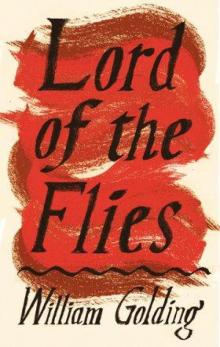 Lord of the Flies
Lord of the Flies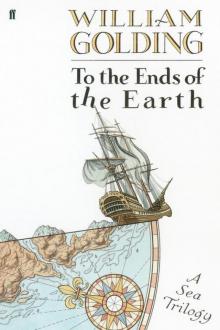 To the Ends of the Earth
To the Ends of the Earth Free Fall
Free Fall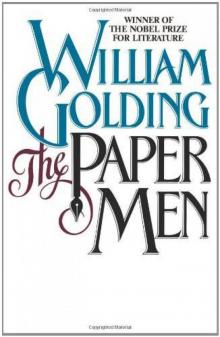 The Paper Men
The Paper Men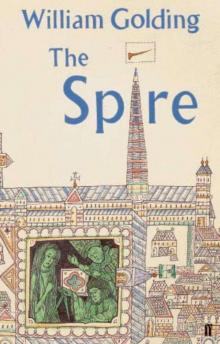 The Spire
The Spire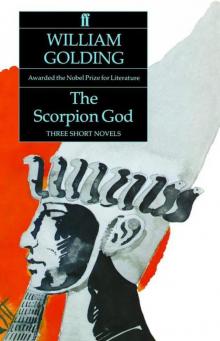 The Scorpion God: Three Short Novels
The Scorpion God: Three Short Novels The Inheritors
The Inheritors Darkness Visible: With an Introduction by Philip Hensher
Darkness Visible: With an Introduction by Philip Hensher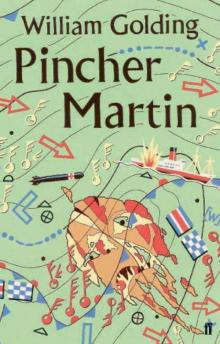 Pincher Martin
Pincher Martin The Pyramid
The Pyramid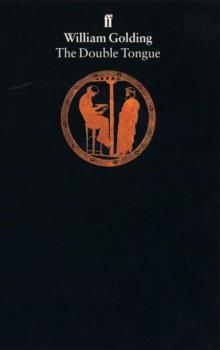 The Double Tongue
The Double Tongue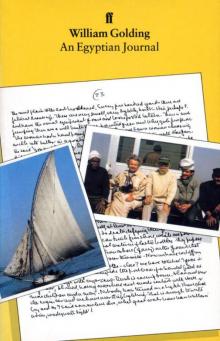 An Egyptian Journal
An Egyptian Journal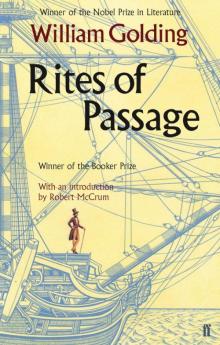 Rites of Passage
Rites of Passage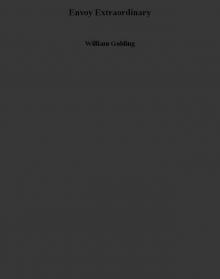 Envoy Extraordinary
Envoy Extraordinary